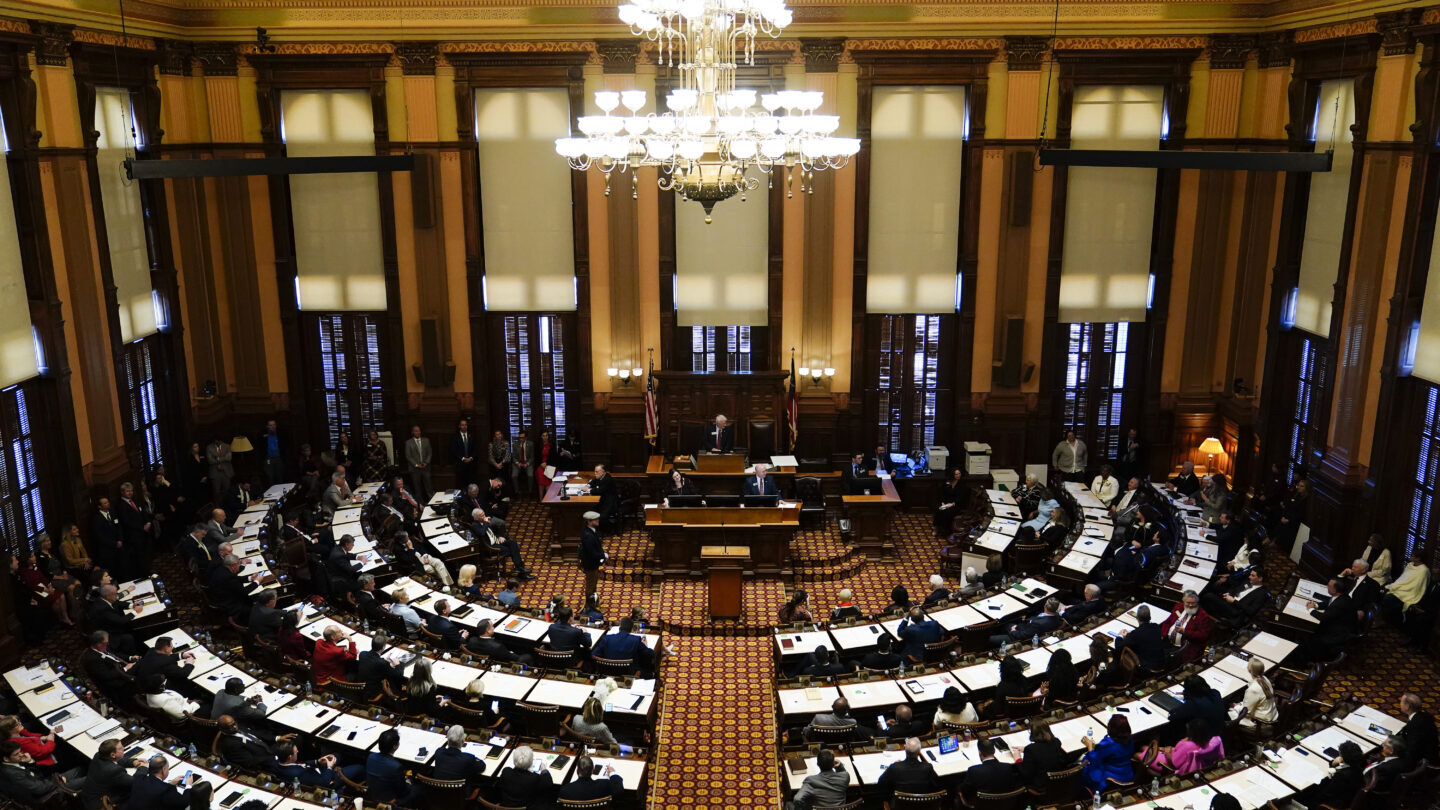Georgia prepares to approve new political maps ahead of 2024

A court order has made it clear: by early December, Georgia lawmakers must create more majority-Black political districts to satisfy the federal Voting Rights Act.
But exactly how mapmakers adjust the current lines to comply will almost certainly be contentious.
A few days after Thanksgiving, lawmakers will file into the State Capitol for a Nov. 29 special session to approve new maps. And with the GOP in control of both chambers, Republicans hold all the pencils.
So one question is whether they might find a way to preserve their current partisan advantage while still complying with orders to add majority-Black districts.
“It is not acceptable to rob Peter to pay Paul, so to speak,” says Ari Savitzky, a senior staff attorney for the ACLU who argued one of the Georgia redistricting cases.
What Savitzky’s referring to is a strategy where Republicans create new majority-Black districts, but dismember existing Democratic-voting districts to cancel out any partisan gains for Democrats.
In his 516-page ruling, U.S. District Judge Steve Jones warned Georgia lawmakers that they cannot create new majority-Black districts at the expense of existing minority opportunity districts elsewhere.
An example would be following the court’s instruction to create a new majority-Black Congressional district in west metro Atlanta, but preserving Republicans’ 9-5 advantage by splitting up the 7th Congressional District centered in Gwinnett County. That district is not majority-Black, but is majority-minority and has voted overwhelmingly for Democrats.
“The State cannot remedy the Section 2 violations described herein by eliminating minority opportunity districts elsewhere in the plan,” Jones wrote.
University of Georgia Prof. Charles Bullock says attempting to skirt the court’s instruction would be risky.
“I would think that the Georgia legislature would take a lesson from what they saw happen in Alabama within the last few months,” says Bullock, who is the author of “The History of Redistricting in Georgia.”
In Alabama, the courts also told lawmakers to add an additional Congressional district where Black voters have a shot to elect their preferred candidate. But when the GOP-led legislature revised the map, lawmakers tried to draw the new district so it likely still wouldn’t have enough Black voters to elect a Democrat.
The courts ruled that Alabama’s new map still did not comply with the VRA and appointed a special master to finish the job.
“I can’t imagine that the Republican majority would like to have a special master come in and change lots of their districts and make it much more difficult for a lot of Republicans,” Bullock says.
When the ink is dry, at least some incumbent Republicans may be out of luck, and Bullock says there will be plenty of jockeying over which ones.
“If you’re one of those whose district is going to be sacrificed, you’re probably going to say, ‘draw this a little differently. Instead of sacrificing me, sacrifice my neighbor,” Bullock says.
Legal challenges may continue
The state says it plans to appeal Jones’ decision, but notified the court on Wednesday that it won’t try to pause his order while the appeal plays out.
“Defendant Secretary of State Brad Raffensperger hereby notifies the Court that, although he plans to appeal the rulings in the Section 2 cases on the merits, he will not seek a stay of the orders enjoining the use of the 2021 redistricting plans while any appeals of those orders are pending,” Georgia Attorney General Christopher Carr wrote in a court filing.
That means new maps will very likely be in place for the 2024 elections. It is possible, however, that an appeals court ruling in the state’s favor could revert the maps for 2026.
“We don’t think it’s likely,” says George Varghese, an attorney with the firm Wilmer-Hale, which represents the plaintiffs. “We think instead that really what they’re trying to do is to challenge the constitutionality of the Voting Rights Act in its entirety. The Supreme Court upheld Section 2 of the Voting Rights Act and we feel confident that if it goes that far, they’ll do it again.”
“Long-denied aspirations”
Andrea Young, executive director of the ACLU of Georgia, is encouraging people to step back from the legal technicalities and the political jockeying to view the redistricting order within the broader sweep of Georgia history.
She says it represents “the long-denied aspirations of Black Georgians to be full citizens of Georgia, to be fully represented in a state where for many of us, our ancestors were enslaved, where we suffered under Jim Crow laws, where we now pay taxes, build the economy and the culture.”
Bullock teaches a class on Southern politics and his syllabus has long included a section on redistricting. He says redistricting is crucial to understanding the changing politics of the South.
“If you were to go back and look at a composite picture of the Georgia General Assembly in 1960, it’s all white,” Bullock says.
But a 1962 decision by the U.S. Supreme Court struck down Georgia’s county-unit system, which for decades had given disproportionate representation to rural counties at the expense of urban ones.
Later that year, Leroy Johnson ran in a newly-created state Senate seat in Fulton County, becoming the first Black Georgian elected to the Georgia General Assembly, or any Southern legislature, in roughly five decades.
And today, as Georgia’s population shifts to racially-diverse cities and suburbs and political maps are drawn to reflect those shifts, Georgia’s political representatives are becoming more diverse — and Democratic.
In Georgia’s redistricting ruling, Jones found that “Georgia has made great strides since 1965 towards equality in voting. However, the evidence before this Court shows that Georgia has not reached the point where the political process has equal openness and equal opportunity for everyone.”
Jones noted that Black voters have fueled Georgia’s population boom, but they did not see that growth translate into adequate representation in the state legislature or Congress because the political maps drawn after the last census illegally diluted their voting power.
Similar fights over redistricting maps and political representation amid demographic shifts are happening across the South, where lawsuits have challenged political maps in several states under the Voting Rights Act.
“As with so much in contemporary politics, it’s playing out here in the South,” Bullock says. “The South is the place where politics are the most interesting of any place in the nation.”








